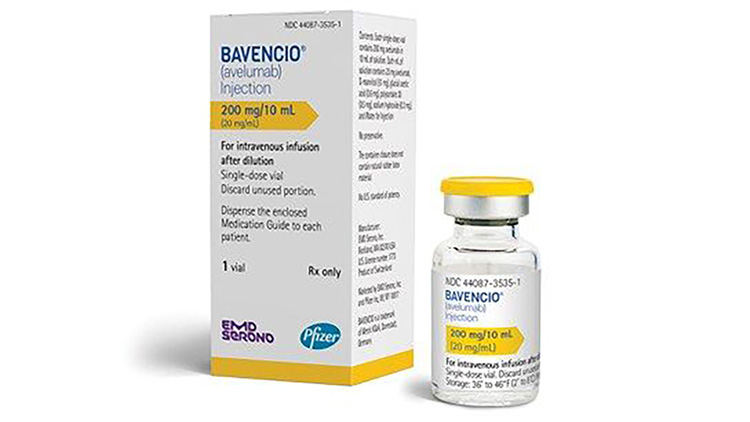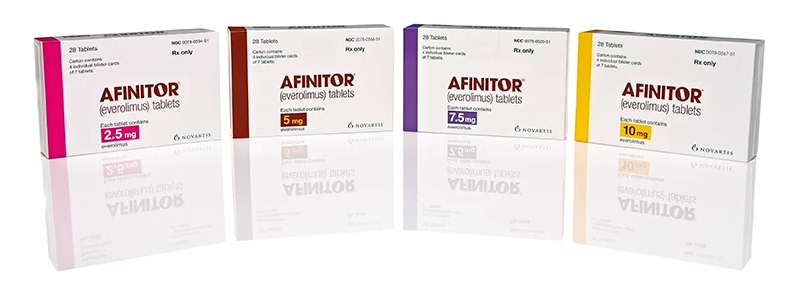Bavencio (avelumab) vs Afinitor (everolimus)
Bavencio (avelumab) vs Afinitor (everolimus)
Bavencio (avelumab) is a PD-L1 blocking antibody used primarily as an immunotherapy for certain types of cancer, including Merkel cell carcinoma and urothelial carcinoma, by enhancing the body's immune response against cancer cells. Afinitor (everolimus), on the other hand, is an mTOR inhibitor that is used to treat various types of cancers such as advanced renal cell carcinoma, certain breast cancers, and neuroendocrine tumors, by interfering with cancer cell growth and proliferation. The choice between Bavencio and Afinitor would depend on the specific type of cancer a patient has, its stage, the patient's overall health, and how the cancer responds to treatment, as each medication has a different mechanism of action and is approved for different indications.
Difference between Bavencio and Afinitor
| Metric | Bavencio (avelumab) | Afinitor (everolimus) |
|---|---|---|
| Generic name | avelumab | everolimus |
| Indications | Metastatic Merkel cell carcinoma, urothelial carcinoma, renal cell carcinoma | Advanced hormone receptor-positive, HER2-negative breast cancer, advanced neuroendocrine tumors, renal cell carcinoma, tuberous sclerosis complex-associated partial-onset seizures, renal angiomyolipoma, subependymal giant cell astrocytoma |
| Mechanism of action | PD-L1 inhibitor, immune checkpoint inhibitor that helps the immune system attack cancer cells | mTOR inhibitor, inhibits mammalian target of rapamycin responsible for cell growth, proliferation, motility, and survival |
| Brand names | Bavencio | Afinitor, Afinitor Disperz |
| Administrative route | Intravenous infusion | Oral |
| Side effects | Fatigue, musculoskeletal pain, diarrhea, nausea, infusion-related reactions, rash, decreased appetite | Stomatitis, infections, rash, fatigue, diarrhea, edema, abdominal pain, nausea, fever, asthenia |
| Contraindications | Patients with severe hypersensitivity to avelumab or any of its components | Patients with hypersensitivity to everolimus or other rapamycin derivatives |
| Drug class | Monoclonal antibody, PD-L1 blocking antibody | mTOR inhibitor, kinase inhibitor |
| Manufacturer | Merck KGaA, Pfizer | Novartis |
Efficacy
Bavencio (Avelumab) Efficacy in Kidney Cancer
Bavencio (avelumab) is a programmed death ligand-1 (PD-L1) blocking antibody used in the treatment of various types of cancer, including kidney cancer. Specifically, it has shown efficacy in the treatment of advanced renal cell carcinoma (RCC), which is the most common type of kidney cancer. When used in combination with axitinib, a tyrosine kinase inhibitor, avelumab has been approved for the first-line treatment of patients with advanced RCC. Clinical trials have demonstrated that this combination significantly improves progression-free survival when compared to sunitinib, another standard treatment. Furthermore, the combination of avelumab and axitinib has also shown an increased overall survival rate, although the data may still be maturing.
The effectiveness of Bavencio in kidney cancer was highlighted in the JAVELIN Renal 101 study, which was a phase III clinical trial. This study showed that treatment-naïve patients with advanced RCC had a substantial benefit from the combination of avelumab and axitinib. The results indicated a reduction in the risk of disease progression or death in patients with PD-L1 positive tumors. Moreover, objective response rates were also higher in the combination therapy group compared to those treated with sunitinib alone.
Afinitor (Everolimus) Efficacy in Kidney Cancer
Afinitor (everolimus) is an mTOR inhibitor that has been approved for the treatment of advanced RCC after failure of initial treatment with sunitinib or sorafenib, which are tyrosine kinase inhibitors. Everolimus works by inhibiting the mammalian target of rapamycin (mTOR), a protein that plays a critical role in the proliferation and growth of cancer cells. In clinical trials, everolimus has been shown to extend progression-free survival in patients with metastatic RCC who have progressed on other targeted therapies. While everolimus does not cure kidney cancer, it can slow the progression of the disease.
The RECORD-1 trial, a pivotal phase III study, demonstrated the efficacy of everolimus in patients with metastatic RCC who had progressed on previous VEGF-targeted therapies. The study showed a significant improvement in median progression-free survival in patients treated with everolimus compared to placebo. The benefit of everolimus was observed across various patient subgroups, including different risk categories and prior treatments. However, it's important to note that the overall survival benefit with everolimus is less clear, and the treatment is associated with a range of potential side effects that need to be managed appropriately.
Regulatory Agency Approvals
Bavencio
-
European Medical Agency (EMA), European Union

-
Food and Drug Administration (FDA), USA

-
Health Canada

-
Pharmaceuticals and Medical Devices Agency (PMDA), Japan

-
Therapeutic Goods Administration (TGA), Australia

Afinitor
-
European Medical Agency (EMA), European Union

-
Food and Drug Administration (FDA), USA

-
Health Canada

-
Pharmaceuticals and Medical Devices Agency (PMDA), Japan

-
Therapeutic Goods Administration (TGA), Australia

Access Bavencio or Afinitor today
If Bavencio or Afinitor are not approved or available in your country (e.g. due to supply issues), you can access them via Everyone.org.
How it works

Make an enquiry
Choose the medicine you want to buy, answer a couple of questions, and upload your prescription to speed things up. We’ll get back to you within 24 hours.


Make an enquiry
Choose the medicine you want to buy, answer a couple of questions, and upload your prescription to speed things up. We’ll get back to you within 24 hours.


Breeze through the paperwork
We'll guide you through the required documents for importing unapproved medicine, ensuring you have all the necessary information.


Get a personalized quote
We’ll prepare a quote for you, including medicine costs and any shipping, administrative, or import fees that may apply.


Receive your medicine
Accept the quote and we’ll handle the rest - sourcing and safely delivering your medicine.

Some text on this page has been automatically generated. Speak to your physician before you start a new treatment or medication.
Let's talk
If you have any questions, call us or send us a message through WhatsApp or email:
Contact us




